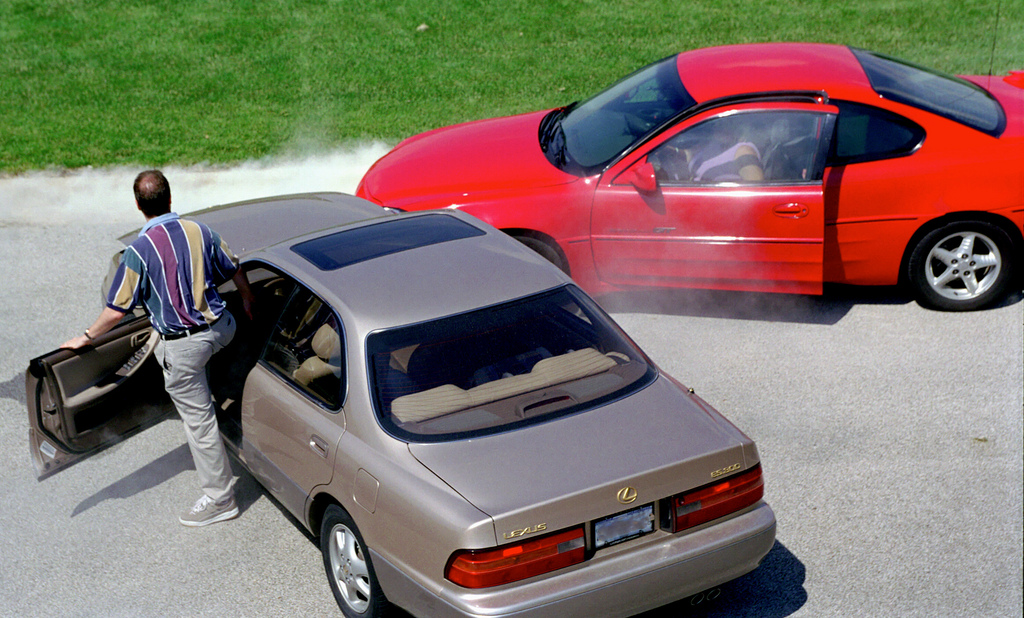In a sign of finally catching up to the times, the federal government is proposing that all future vehicles should have the capacity to communicate with each other while on the road. The proposal is meant to curb traffic accidents caused by drivers unable to judge road conditions, particularly with regards to oncoming traffic. This effectively puts vehicle-to-vehicle (V2V) communication right at the top of the traffic priority list.
V2V essentially allows vehicles to exchange data with regards to their speed, location, direction, and even capacity, at a rate of ten times each second, The Washington Post reports. This would then allow the vehicles to get certain information that would not normally be available to ordinary drivers.
For example, if a car is about to run a red light at 60 mph, the car equipped with V2V sensors would be able to offer some countermeasures to avoid a collision. The same goes for situations wherein vehicles are speeding around a blind curve or if another vehicle is attempting to merge into traffic faster than it should be going.
The fact of the matter is that human drivers are incredibly flawed, especially when taking emotional aspects, intoxication, or modern distractions into account. Ideally, a driver should always be alert when behind the wheel, ready to react to any unexpected turn of events on the road at a moment’s notice. However, this is simply not the case, which is why there are so many road accidents every year.
According to officials, integrating V2V can potentially prevent up to 80% of traffic accidents. Transportation Secretary Anthony Foxx also explains that this is simply a common sense approach to preventing deaths.
“V2V will provide 360-degree situational awareness on the road,” Foxx said. “We are carrying the ball as far as we can to realize the potential of transportation technology to save lives.”
The move has already received the blessing of the biggest coalition of auto makers in the world. With the Association of Global Automakers backing the proposal, it’s only a matter of time before cars chatting with each other becomes the norm.



 Palantir Stock Jumps After Strong Q4 Earnings Beat and Upbeat 2026 Revenue Forecast
Palantir Stock Jumps After Strong Q4 Earnings Beat and Upbeat 2026 Revenue Forecast  Supreme Court Signals Skepticism Toward Hawaii Handgun Carry Law
Supreme Court Signals Skepticism Toward Hawaii Handgun Carry Law  CK Hutchison Launches Arbitration After Panama Court Revokes Canal Port Licences
CK Hutchison Launches Arbitration After Panama Court Revokes Canal Port Licences  SpaceX Prioritizes Moon Mission Before Mars as Starship Development Accelerates
SpaceX Prioritizes Moon Mission Before Mars as Starship Development Accelerates  Supreme Court Tests Federal Reserve Independence Amid Trump’s Bid to Fire Lisa Cook
Supreme Court Tests Federal Reserve Independence Amid Trump’s Bid to Fire Lisa Cook  US Judge Rejects $2.36B Penalty Bid Against Google in Privacy Data Case
US Judge Rejects $2.36B Penalty Bid Against Google in Privacy Data Case  Elon Musk’s Empire: SpaceX, Tesla, and xAI Merger Talks Spark Investor Debate
Elon Musk’s Empire: SpaceX, Tesla, and xAI Merger Talks Spark Investor Debate  Global PC Makers Eye Chinese Memory Chip Suppliers Amid Ongoing Supply Crunch
Global PC Makers Eye Chinese Memory Chip Suppliers Amid Ongoing Supply Crunch  Nvidia, ByteDance, and the U.S.-China AI Chip Standoff Over H200 Exports
Nvidia, ByteDance, and the U.S.-China AI Chip Standoff Over H200 Exports  Federal Judge Restores Funding for Gateway Rail Tunnel Project
Federal Judge Restores Funding for Gateway Rail Tunnel Project  Citigroup Faces Lawsuit Over Alleged Sexual Harassment by Top Wealth Executive
Citigroup Faces Lawsuit Over Alleged Sexual Harassment by Top Wealth Executive  Newly Released DOJ Epstein Files Expose High-Profile Connections Across Politics and Business
Newly Released DOJ Epstein Files Expose High-Profile Connections Across Politics and Business  Uber Ordered to Pay $8.5 Million in Bellwether Sexual Assault Lawsuit
Uber Ordered to Pay $8.5 Million in Bellwether Sexual Assault Lawsuit  SpaceX Reports $8 Billion Profit as IPO Plans and Starlink Growth Fuel Valuation Buzz
SpaceX Reports $8 Billion Profit as IPO Plans and Starlink Growth Fuel Valuation Buzz  Instagram Outage Disrupts Thousands of U.S. Users
Instagram Outage Disrupts Thousands of U.S. Users  Meta Faces Lawsuit Over Alleged Approval of AI Chatbots Allowing Sexual Interactions With Minors
Meta Faces Lawsuit Over Alleged Approval of AI Chatbots Allowing Sexual Interactions With Minors 































